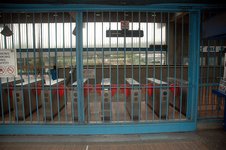 |
| Angelika/Mike Schilli |
|
Angelika By American standards, San Francisco and the Bay Area are exemplary when it comes to public transportation offerings. There's buses, street cars, and a subway. The subway system BART (Bay Area Rapid Transit) features a single line within the limits of the city of San Francisco, extending all the way south to SFO airport, but also also connects the East Bay (Oakland, Richmond, Berkeley, Pleasanton) with San Francisco, crossing the Bay waters via an underwater tunnel.
Since San Francisco is surrounded by water, you'll run into a bridge to be crossed sooner or later, which during rush hour inevitably leads to hopelessly clogged roads. On the Bay Bridge, connecting San Francisco and Oakland on the East Bay side, there's often bumper-to-bumper traffic and disgruntled drivers are stuck in traffic for hours. For this reason, the BART subway system is an indispensable transportation alternative. About 400,000 commuters are using BART every day. In my personal opinion, that's still too few, but the rider numbers have doubled in the last fifteen years. In recent weeks, we've found out the hard way how important BART has become: BART workers went on strike between July 1st and 4th.
Labor protests are relatively rare in the US, as unions have been weakened over the years. The last time BART workers went on strike was sixteen years ago, for example. But it still happens. BART employees are, to put it simply, public servants of the State of California. On top of ticket sales, BART is supported by the tax payers, it's not a private company.
What were the striking BART workers looking for? No doubt for higher compensation, but also for better social benefits. As a non-resident, you're probably surprised to hear that in the U.S., many social benefits, like vacation, aren't regulated by law. Instead, there are significant differences in what individual companies offer their employees. BART management wants, for example, that their employees increase their montly payments for their health benefits and raise the contributions for the corporate pension fund, of which the employer is currently paying the entire amount. Also, every BART employee pays $92 per month for health insurance, regardless of how many family members (e.g. children) are covered.
It's quite the norm in the U.S. that affluent tech companies pay their employee's health insurance premiums in full, requesting only a small contribution from employees in most cases. Companies like Apple, Google, Yahoo have been doing that for years to be able to attract qualified and happy software specialists. My employer's health plan, on the other hand, requires employees to foot a much larger amount, although our salaries are tiny in comparison. For this reason, I prefer to be insured with Michael, although I'm working full time.
BART workers take home surprisingly high salaries, compared to other positions in the industry only requiring a high school diploma. Depending on who you ask, employees or BART management, a BART worker's yearly base salary runs somewhere between $60,000 and $80,000, and on top of that, there's an obscure system of overtime payments and social benefits.
This inevitably led to some resentment expressed by Bay Area citizens, although they are known for their liberal views. Many felt that the strike wasn't justified. I think it's about time to establish better working condition for all workers across the entire U.S., like statutory requirements for sick days and maternity leave. But that's probably a pipe dream, in light of how elected officials quarreled with each other to get the national health insurance in place. In any case, since July 5th, BART has been operating normally again, since the old labor agreement was extended by 30 days. But this means that there's a chance that the trains will stop running again next month, if the two parties can't get to an agreement.
















